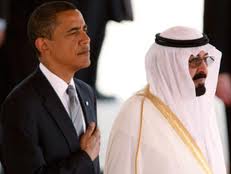 Saudi Arabia maintained a discreet silence on Sunday about the Iranian nuclear deal in Geneva but is thought likely to issue a guarded welcome despite its strong and clearly signaled reservations about what it fears is the rehabilitation of its longstanding regional rival.
Saudi Arabia maintained a discreet silence on Sunday about the Iranian nuclear deal in Geneva but is thought likely to issue a guarded welcome despite its strong and clearly signaled reservations about what it fears is the rehabilitation of its longstanding regional rival.
Analysts in Riyadh said it would be diplomatically impossible for the Saudi government to publicly condemn an agreement designed to contain Iranian nuclear ambitions however deep its concerns about the direction of evolving US policy.
The Saudis have been unusually vocal in recent weeks in warning about a rapprochement between the US and Iran after more than 30 years of estrangement. King Abdullah is also openly unhappy with Barack Obama’s policy on Syria – in some ways a proxy war between the Saudis and Iran – and is stepping up efforts to aid rebels fighting President Bashar al-Assad.
In Damascus, the Syrian government, significantly, was quick on Sunday to welcome what it called “an historic accord”. Iran is Assad’s most important regional ally.
Mohammad bin Nawwaf, the Saudi ambassador to Britain, warned at the weekend that the kingdom would not “sit idly by” if Iran acquired a nuclear weapon. But as the Geneva deal aims to prevent that, Riyadh has little choice but to insist on full implementation and careful monitoring.
Diplomats predict that the Saudis and their Gulf neighbors, especially the United Arab Emirates, may seek to obtain security guarantees from the US in the event of a final agreement with Iran. King Abdullah is assumed to have discussed the issue in a previously unannounced summit meeting with the emirs of Qatar and Kuwait in Riyadh on Saturday as the Geneva talks were reaching their climax.
“Anything that lessens tensions in the region is welcome,” said the Saudi commentator Khaled Almaeena. “We were all on tenterhooks. Advocates of attacking Iran should know that we were facing terrible problems in the Gulf. Property values in the UAE would have gone down because people expected Iranian retaliation in case of war. We are concerned about the environment and our security.
“Both Iran and the P5+1 [the powers that concluded the accord with Tehran] will have to work hard. But we hope Israel will not throw a monkey wrench into this deal.”
Saudi Arabia has long-signaled that it would also seek to acquire nuclear weapons – most likely from Pakistan – if Iran had them. Its own security interests lie in seeing this agreement succeed. But it fears that a new relationship between Washington and Tehran will be at its expense. Iran’s backing for Assad, its intimate relationship with Hezbollah in Lebanon and support and inspiration for Shias in Iraq, Bahrain and Saudi Arabia’s eastern province are all issues of profound concern.
The Saudis and the other Gulf states spent billions of dollars backing Saddam Hussein in his 1980-88 year war against Iran – itself a response to the fears created by the 1979 Islamic revolution. Adjusting to a genuine thaw in relations between the west and Tehran is not going to be easy.
The Guardian

Leave a Reply
You must be logged in to post a comment.